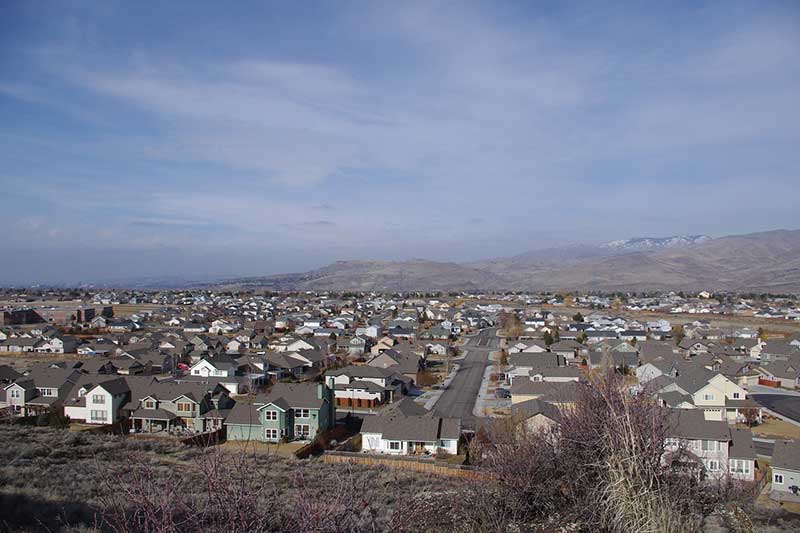This page may contain affiliate links. If you click and buy, we might get a small commission at no cost to you.
When looking for homes to buy, you have probably run across houses in homeowners associations. You may have even fallen in love with a home located inside one of these communities, and have added it to your list of potential homes to purchase. If you have never looked into HOAs, you may not be familiar with them and are probably wondering what are the pros and cons of a homeowners association?
What is a homeowners association?
A homeowners association, also called an HOA, is an organization made up of homeowners living in the same community. The association creates and enforces rules and bylaws that everyone living in that community has to follow.
Residents inside the HOA community are also required to pay monthly fees for various amenities provided by the association. This type of association that has rules to follow of course creates an assortment of pros and cons for potential homebuyers.
What are the pros and cons of a homeowners association?
Pros: 5 benefits of a homeowners association
Homeowners associations were first created by land developers in the early 20th century. These land developers wanted to maintain a certain appearance to their communities, and they determined that having rules and bylaws was the best way to do this.
While that may not sound like the most desirable aspect of HOAs, they do provide a wide array of benefits that homebuyers of all ages find pleasing.
1. You live in an up-kept, nice neighborhood
HOAs have strict guidelines to help ensure the community is well-groomed. An example of this is that most HOA communities require lawns to be regularly cut and manicured.
They can also restrict what can and cannot be left in your yard. You probably won’t see broken-down vehicles sitting on the front lawn of homes in HOA communities.
There may even be strict regulations against things like having a broken fence or even one that leans too much. While some of these things can seem very picky and unnecessary, they usually amount to a nice looking neighborhood.
2. There are amenities
Most HOAs offer amenities that residents have access to, such as pools, playgrounds, fitness centers, and even security gates. These are items that you don’t have to pay extra for since they are already included in the monthly HOA fees.
Furthermore, these common areas are maintained by the HOA so they will have the same level of upkeep and maintenance that the entire community has.
3. Disputes are handled by the HOA
Neighborhood disputes are not uncommon, but they are uncomfortable. The homeowners association will step in to mediate disputes between neighbors.
Since the HOA enforces the rules set out in their guidelines, all you have to do is file a complaint with the HOA and they will take control of the matter for you. The conflict-avoidance that HOAs provide is a major benefit provided by these communities.
4. The HOA may take care of the exterior of your home
Some homeowner’s associations take on the responsibility of maintaining the exterior of all homes in the community. This includes mowing, weeding, power washing, replacing or repairing siding, fixing fences, and even repairing roofs. This could save homeowners hundreds of dollars a year on exterior home maintenance.
5. A sense of community with your neighbors
For some, HOAs provide a sense of community that they just cannot get in other neighborhoods. It is common for HOAs to have community events to gather all residents together for some family-friendly fun. Furthermore, residents can become members of their HOA board and work to help maintain their community.
Cons: 6 drawbacks of homeowners associations
While the positive aspects of an HOA are attractive, there are several drawbacks to these types of communities that you need to consider before signing the papers for that new home.
1. A homeowner’s association has fees
HOA fees or dues are typically required for all residents living inside the community. The actual amount varies widely from one HOA to the next.
They can be as little as $100 annually and as expensive as over $1,000 a month. This extra fee, especially when you’re already paying for a mortgage and home-owner’s insurance, can take a toll on your monthly budget.
2. No renting out your home
HOAs typically do not want homeowners renting out their homes. The community doesn’t want to deal with temporary residents coming into their community.
3. Screening buyers if you decide to sell
They also require screening any future residents. While this is good in some ways, for those people who are trying to sell their home, this simple act can jeopardize your ability to close the deal.
4. HOA can foreclose on your home
Some states allow the HOA to foreclose on your home if you don’t pay the dues set forth by the association. This, however, does vary from one state to the next, and some states even place limitations on the timeframe for when the HOA can foreclose on your home. Make sure to check with your state to see if they allow HOAs to foreclose on homes.
5. Home-based businesses may not be allowed
Most home owners associations frown on home-based businesses, especially those that include commercial activities. So, for people with at-home businesses, a HOA may not be the ideal place for you.
6. Limited freedom
HOA-run communities have rules that everyone living in said community has to follow. While some of these rules are usually not too bad, such as no loud music after a certain timeframe , others can feel as if the board is overstepping its bounds.
Some HOA communities, for example, will only allow certain flowers, shrubs, and trees to be planted, while others limit what color the exterior of your home can be or what lawn ornaments you can have. In fact, a man in California was fined by his homeowners association for planting what the HOA stated was an excessive amount of roses.
Things to consider before making your decision.
The information provided above has given you a lot of things to consider before making the jump into an HOA. For some people, living in a community run by a homeowner’s association is the dream, while others find it stifling.
It all depends on what you want from your home and neighborhood. If you prefer a well managed community with rules and regulations that also provide amenities and exterior home maintenance, then the downsides of an HOA may not be a deal breaker.
If, however, you want freedom to do what you want with the home you paid for, and don’t want to shill out even more money every month for fees, then you should avoid HOAs.


